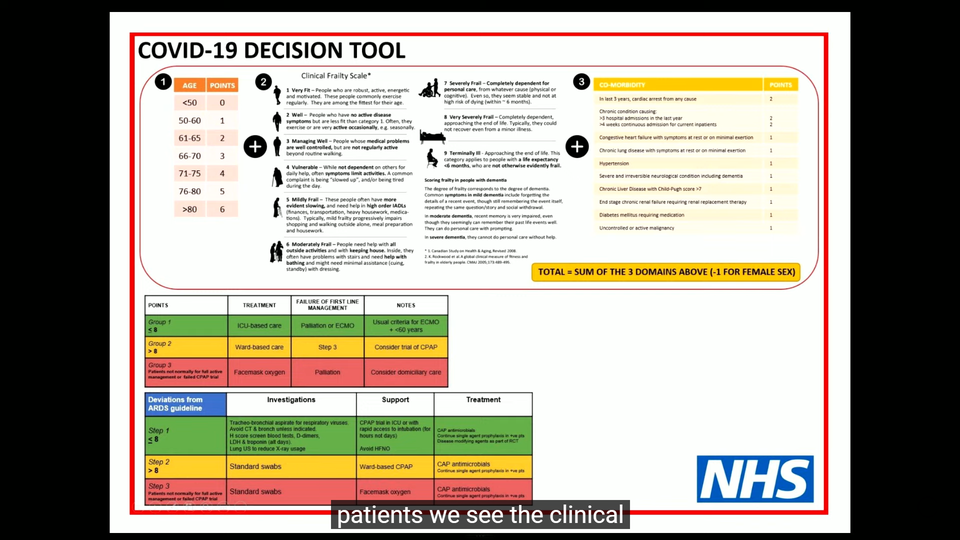The nation’s top doctor has described how he was “terrified” the NHS was going to be overwhelmed as officials drew up an unpublished document describing who should be prioritised for care if the service exceeded capacity in the early stages of the Covid-19 pandemic.
The document was never officially released as it became clear that the nation was reaching the peak of the crisis, NHS England’s national medical director said.
Professor Sir Stephen Powis told the UK Covid-19 Public Inquiry that the work was something that “nobody ever wants to do”.
The “prioritisation” document was written in March 2020 to be considered should the NHS become overwhelmed with Covid-19 cases.
We need your consent to load this Social Media content. We use a number of different Social Media outlets to manage extra content that can set cookies on your device and collect data about your activity.
The inquiry was shown the unpublished document, titled Covid-19 Decision Tool, which highlights three elements to consider when prioritising care: age; “clinical frailty” and “comorbidities”.
Patients were given “points” based on their age, with under 50s placed at zero and 80-year-olds starting at six points.
It also ranked patients from one to nine, one being fit and well and nine being terminally ill, while co-morbidities such as previous heart attacks, high blood pressure and heart failure also scored with points.
A point was taken off for women.
The scores would then dictate what sort of care should be provided to the patient.
Sir Stephen said: “In terms of this decision tool, which was never authorised, it was never officially released.
“It didn’t go beyond this stage other than the group that developed it subsequently published a version of it in an Intensive Care Society set of principles around decision-making.”
The inquiry heard that the “impetus” for the document came from the Department of Health and Social Care but on March 28 a decision was made that it should not go ahead.
Sir Stephen continued: “This was at a point in March where cases of Covid were rapidly increasing.
“The strategy that the NHS and government had taken was, on the one hand, to put in social distancing, in other words lockdown, to reduce the rate of transmission, and within the NHS our job was to surge capacity.
“But at that point in March, the number of patients with Covid in ITU (intensive care) beds was doubling every five to seven days.
“We couldn’t see – because there was no community testing at the time – what was likely to come ahead.
“It was not clear whether the public would respond to lockdown – they did wonderfully, but that was not clear.
“Frankly, I was personally terrified, terrified that the NHS was going to be overwhelmed and doctors were going to be placed in a position, and other clinicians, where they would not be able to make the professional judgment that they usually make in terms of treatments and escalation.
“And in those circumstances, I and my clinical colleagues and CMOs (chief medical officers), felt that we should begin to explore a decision tool such as this.”
He added: “It was halted, I think because a number of us, the Chief Medical Officer, myself, with input from the (then) chief executive of NHS England, came to the conclusion that it should not be released.
“For me, the main reason was at this point, it was becoming increasingly clear to me that the peak of the pandemic was approaching and, therefore, it would not be needed, because we would not breach capacity.
“It became very apparent to me that it was not going to be needed, and I had a fear that if it was released, it might be used when it would not need to be.”
A screenshot showing details of the unpublished document from the UK Covid-19 Inquiry (UK Covid-19 Inquiry/PA)
There was also a “danger” that the tool would have taken away some professional judgment made by doctors and could have been seen as “too simplistic”.
“I think it was right to stand it down because we didn’t need it and it could have been used inappropriately,” he said.
Sir Stephen also said he shared a concern that the document would be controversial and risk poor reaction from the public.
“This is not a criticism of the group of clinicians who worked on this, they did a magnificent job,” he told the pandemic probe.
“They were asked to do something that nobody ever wants to do – to develop this sort of tool, and they had to do it rapidly.
“But it became absolutely clear to me that this was going to be controversial, that it hadn’t had the opportunity to be discussed more widely with patient groups, with public and so my recommendation to the inquiry is that we should absolutely, in future, not try and develop one of these tools in the midst of a pandemic.
“This is a discussion that has to occur in normal times.
“In my view, it’s a discussion that shouldn’t be government led, it shouldn’t even be led by the profession, it needs to be located within society.
“This is too hard a task to do at the height of the pandemic.”
It comes as the inquiry’s Every Story Matters campaign hit the 50,000 submission milestone.
The public engagement exercise is aiming to better understand the public’s pandemic experiences and will shape the probes recommendations.
Ben Connah, secretary to the Covid-19 inquiry, said: “I would like to thank every member of the public who took the time to come and visit our team, or contribute in any other way, throughout 2024. It has been a privilege to hear what you have to say.
“We have heard of terrible hardship and loneliness, but also true commitment and sometimes even bravery.”
